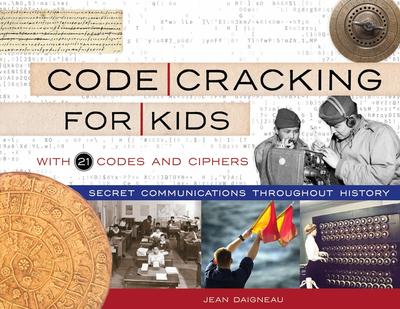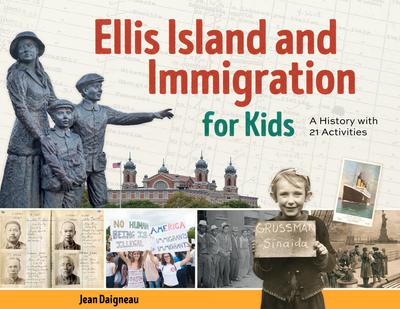


By Melissa Warner Published March 3, 2022
In her most recent work, Ellis Island and Immigration for Kids, author Jean Daigneau (pronounced “Dane-you”) wants to “open kids’ eyes at least to having discussion” about immigration issues. She had no political agenda on this controversial and timely topic, and it was a meaningful subject for her as her grandparents emigrated from Italy. Looking back, she said one regret she has is not having spoken to her own grandparents about their emigration stories. She advised any teen wanting to write nonfiction books to look for a topic that they are “passionate about”, because they “will be with it a long time,” meaning both the topic and the writing.
Her prior book, Codecracking for Kids involved much more research than she anticipated. She stated that she knew a bit about many of the things in her book, but she hadn’t realized the depth of detail. However, she loves research. Ms. Daigneau wrote this book about codes and ciphers because of her love for puzzles – jigsaws, crosswords, sudoku, etc. The origin for Codecracking for Kids was that interest in math combined with having written a time travel book which included use of codes and such, and then a conversation with a fellow author friend. That friend suggested she write a nonfiction book about her interests. Although Ms. Daigneau’s publisher determined the age range for her book, she feels her “voice” is most comfortable with middle grade children. She worked many years in a school library.
As a young child, Ms. Daigneau wanted to be a nun. However, after an unfortunate food incident with the nuns, she decided she would rather be a teacher. By the age of 15, her love of math had emerged but in college she was talked out of majoring in math based on her gender. In high school, she lived too far away from her school to be involved in sports, but was involved in school musicals, a typist and sometimes reporter for the school newspaper, and volunteered as a tutor for kids in the Akron community. What she knows now as an adult that she wishes she knew when she was a very studious teenager is do not stress out so much; still do your best, but many things, in the grand scheme of life, are not as important as they feel now. She would also advise “Appreciate your family and the people in your circle, appreciate every day with them; you never know what tomorrow will bring.”
When asked about a common misconception of being a writer, Ms. Daigneau replied “People think it’s easy; you sit and write and it’s beautiful.” She commented that writing is a lot of work, even for a picture book. There are “techniques and dialogues and the rule of three.” ” Interestingly, she wrote her first book, with a childhood friend, in 6th grade! Unfortunately, the manuscript has been lost to time and house fires. When asked how she handles rejection, she replied that she has had “over 20 years to get used to it” and it is never easy. She noted that sometimes not getting published is about timing rather than the writing. An example is one time when the publisher really liked her book but already had others on the topic and did not want another one. Instead, Ms. Daigneau looks at rejection as practice. Her example was that a Globetrotter does not start out on the team – years and years of practice have to happen first. “It took me 20 years” to be published! In fact, two other books were purchased but never published. Unlike many authors, her characters do not usually “speak” to her. Instead, the process is “organic” and ideas come to her that her character needs to do a certain thing or something particular needs to happen.
What keeps Ms. Daigneau writing is that she “can’t not write.” She recalled advice given to her many years ago: If you had a crystal ball and realized that you would never be published but had to write anyway, you probably have what it takes to be a writer. At this time, her third novel is nearly complete, with the target age of 4th-5th grade readers. She also has many other mostly middle grade works in progress, possibly include a short series on forensics. When asked how Covid affected her writing, like many other authors, she lamented about not getting out to meet readers. She also missed simple things such as getting a coffee at McDonald’s and sitting to write there, and in person writers’ groups.
Parting words of advice would be that writing does not have to be novels or nonfiction. Writing includes letters (she had a pen pal in school) and even school reports. So write, just write!